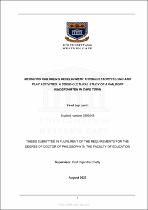| dc.description.abstract | The study focused on a Waldorf kindergarten, investigating the role of storytelling by the teacher, and the free imaginative play of the children. It utilised the socio-cultural theories of Lev Vygotsky as a theoretical lens. The research question centred on how to observe the internalisation of language in a storytelling setting, and whether free play allows for that. If the children expressed the stories in their play and drawings, does this reveal aspects of internalisation? The literature review covered Vygotsky’s theories of development, as well as play and storytelling. The neurological aspects of development were also examined. Vygotsky was one of the first to initiate the term ‘self-regulation’, which has now become one of the leading foci in understanding the development of children emotionally and mentally. This study investigated the roles of language and tools in both storytelling and free play. It also reviewed aspects of the Waldorf philosophy which may have impacted the environment of the study. The children, aged 4 to 7 years, were studied for a year in an ethnographic socio-cultural discourse analysis. Having a socio-cultural lens entailed scrutinising the social role of language in the child’s individual internalisation, as well as imagination, zone of proximal development, private speech, self-regulation and identify formation. The study revealed that children internalised language through both the content of the storytelling, as well as the structure of presenting it. The Waldorf kindergarten provided a specific method of oral telling, puppetry and acting stories, with the same story repetitively over days or even weeks. This offered a level of immersion where the dynamics of internalisation could be revealed through the imaginative play of the children. | en_US |

